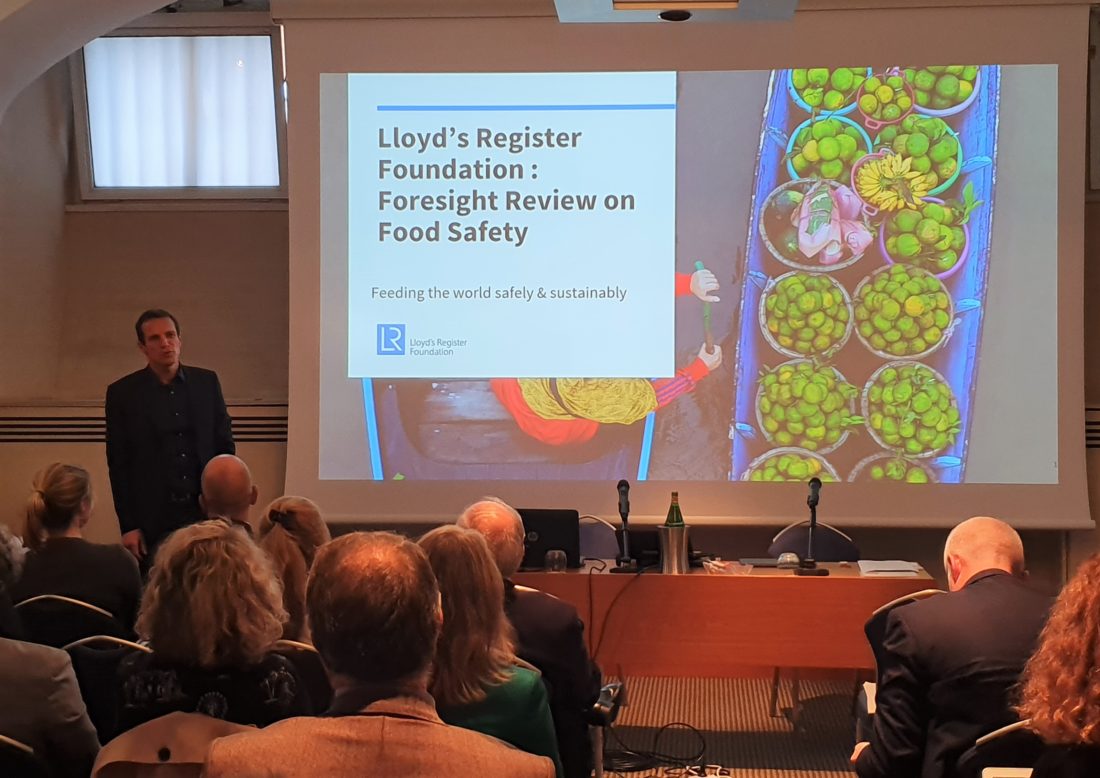Lloyd’s Register Foundation has identified three areas of focus for its future efforts and investment.
A foresight review revealed a roadmap for food safety which focuses on funding and research for education and training, traceability and the ocean of food.
It follows months of research in which more than 100 global industry experts were interviewed during a series of advisory workshops. They included food safety specialists from food brands such as Mars, Danone, and Barilla, academics from universities, representatives from Lloyd’s Register’s specialist food assurance team and non-governmental organizations.
The first workshop was in October last year in Paris, the second in California in December and the final one in January 2019 in Seoul, Korea. Questions to the group were on food safety challenges and the need for evidence-based approaches to further investigate this topic and actions required to limit the growing public health risk.
Education and training and traceability
Education and training in developed and developing countries will attempt to bring together academia, citizens, governments, industry and non-governmental organizations to take action.
Workshop attendees agreed that food safety must be incorporated into educational programs to ensure lasting improvement. This is particularly important in low and middle-income countries most impacted by foodborne diseases and where the lack of food safety specialists is a critical problem.
Lonneke van der Geest, food safety manager at Wageningen University & Research, said professional training can improve food safety and traceability.
“It is critical that knowledge about nutrition, food safety, and sustainability continue to be deepened and broadened through education and training. Action is needed through coalitions and partnerships that work together locally and globally.”
The second recommendation is on traceability in the supply chain and development of a range of technologies to make food more traceable and safer for consumers. The foundation will be looking to invest in projects that link physical foodstuffs and digital records.
“The food supply chain is complex and fragmented, which greatly limits traceability. Yet new life science and data science innovations offer real opportunities to address this challenge and deliver noticeable improvements,” said John Carter, former vice president, quality and food safety at Danone.
Delivering an ocean of food means investing in aquaculture and seafood production for greater food safety and sustainability, focusing on improving current practices and expanding and upscaling for the future.
Start to identify suitable projects
Vincent Doumeizel, food program director for the foundation, said the report is important as it’s a topic that has a huge impact on everyone.
“The foundation is a global charitable organization which focuses on making the world a safer place and following this report, the food program team will now be looking for opportunities to invest in initiatives and technologies that fall in one or more of the three core areas with the ultimate goal of helping make the safe supply of food a reality.”
The foundation has started identifying suitable projects and has submitted a proposal to the EU for two pilot projects in food and energy production in connection with the wider EU program for multi-use of the marine space offshore.
“The goal is to look at offshore aquaculture in combination with other activities in a multi-use setting or standalone environment – these are under development. There are major challenges to overcome, but they need to produce more food, and reduce the impact of aquaculture on coastal areas, more than justifies these efforts,” said Doumeizel.
Another project is a food safety education initiative in East Africa and the Caribbean with the Food and Agriculture Organization of the United Nations (FAO). The objective is to build food safety workforce capacity, leading to enhanced food safety, income and livelihood opportunities.
The Lloyd’s Register Safety Accelerator, a challenge-based accelerator program, is also looking at how traceability can be improved in the supply chain with project partners in the food industry.
(To sign up for a free subscription to Food Safety News, click here.)

